Most Commented
- Cubadebate opens its new Web page in English| 20
- Mandela is dead: Why hide the truth about Apartheid?| 11
- El Paso Diary: The Battle Over the Solo Fax| 10
- President Hugo Chavez's address to the People of Venezuela| 10
- Free the Five is heard at Left Forum| 6
- May every citizen be a constituent| 6
- Raúl receives Kim Yong Chol, Special Envoy of the President of the Workers’ Party of Korea| 6
- The Unsustainable Position of the Empire| 5
- U.S. government promoting Internet aggression against Cuba| 5
- NATO’s Genocidal Role| 4
- The Fiftieth Anniversary Parade| 4
- El Paso Diary: The Tip of the Iceberg| 4
Series
- Cuba's Reasons
- Cuban Five
- El Paso Diary
The El Paso Diary is written by José Pertierra--an attorney who represents the government of Venezuela in its request for the extradition of Luis Posada Carriles. Pertierra´s journals describe the testimony, evidence, legal skirmishes, quirks and follies of this very historic trial that features for the first time the close collaboration of the United States government with Cuban authorities to prosecute an ex CIA agent who is one of the masterminds of the fifty-year old dirty war against Cuba.
Authors
- Bernie Dwyer
- Bruno Rodríguez Parrilla
- Deisy Francis Mexidor
- Fidel Castro Ruz
- José Pertierra
- Raúl Castro Ruz
- Ricardo Alarcón de Quesada
- Amy Goodman
- Arleen Rodríguez Derivet
- Frei Betto
- Hugo Chávez Frías
- Josh R. Nelson
- Juan Gelman
- Luis Rumbaut
- Michael Moore
- Mumia Abu-Jamal
- Noam Chomsky
- Reinaldo Taladrid Herrero
- Richard Gott
- Tom Hayden
Articles of Internet
News »
Colonialism 2.0 in Latin America and the Caribbean

Once the internet became the central nervous system of the economy, research, news, and politics, the United States’ borders were extended across the planet. Only the U.S. and its corporations are sovereign, no other nation-state exists that could reshape the net by itself, to put a brake on Colonialism 2.0, despite local anti-monopoly laws and clear policies supporting sustainability on the social, ecological, economic, and technological order – much less build a viable alternative to disconnect from the so-called information society.
News »
Cuba Takes First Steps in Online Trade

Cuban trade is currently undergoing a reformulation that includes online transactions, which will place the island in better positions for consumption indicators. A report issued on Monday in Cubadebate news website highlights that from next summer Cubans may buy online in Cuban pesos (CUP).
News »
Computerizing society, a joint effort to promote development
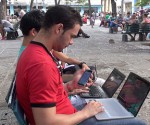
As part of its program to develop telecommunications technologies in the country, Cuba’s telecommunications enterprise (ETECSA) continues to work on expanding the population’s access to the Internet. In this regard, the company’s director, Mayra Arevich, reported that a total of 27,316 persons have now acquired home connections, via Nauta Hogar, available on all the country’s municipalities.
News »
Internet: The same for rich and poor?
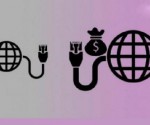
As early as the 1960s, the U.S. Department of Defense had a system that allowed multiple computers located at different universities and research centers in the country to communicate in a single network – the embryo of the great interconnection of networks that we know today as the internet. However, it was not until 1993 that the World Wide Web was put in the public domain.
News »
Internet wars: U.S. plans to overthrow the Cuban Revolution with new technologies
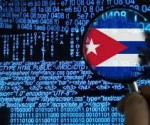
In this modern era of cell phones, the internet, and social networks, it is easy to forget that the U.S. has been using communications technologies to attack Cuba ever since the age of shortwave radios and the emergence of television.
The U.S. State Department’s announcement this past January, of the creation of a Cuba Internet Task Force is, therefore, just another scheme in a long saga of Washington’s subversive plans to overthrow the Cuban Revolution.
News »
Is finished the myth of Internet censorship in Cuba?
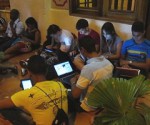
So far, the international press told us that the Cuban government was hindering the internet development in the Island on their quest for controlling the information.
Interestingly, these same mass media reported a few months ago, about the licenses granted by the US President to American companies in the sector to reach investment agreements with Cuban state company ETECSA in order to improve Internet on the Island
News »
5 Unexpected Places You Can Be Tracked With Facial Recognition Technology

Post-9/11, many airports and a few cities rushed to install cameras hooked to facial recognition technology, a futuristic apparatus that promised to pick out terrorists and criminals from milling crowds by matching their faces to biometric data in large databases. Many programs were abandoned a few years later, when it became clear they accomplished little beyond creeping people out.
News »
Cyberwar Against Cuba. Summit Kicks off Monday in Panama
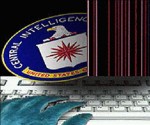
futures trading strategies p>(The South Journal) Panama will be the venue of an event to be held April 11-15, whose objective is the setting up of an “elite international task force” to enhance the cyberwar against Cuba. The sponsors of this meeting, under the intellectualized name of “Thinking Cuba”, use military terms like “task force”,
News »
U.S. government promoting Internet aggression against Cuba

The Department of State and its destabilizing agency USAID project spending a further $30 million on interventionist operations attempting to use the Internet as an instrument of infiltration and intelligence within Cuban national territory.
